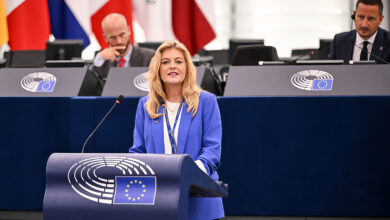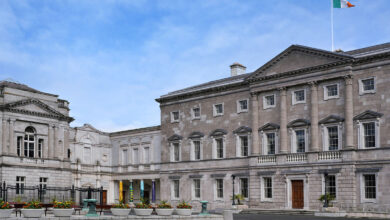Kevin Bell Repatriation Trust: “The Irish are everywhere”
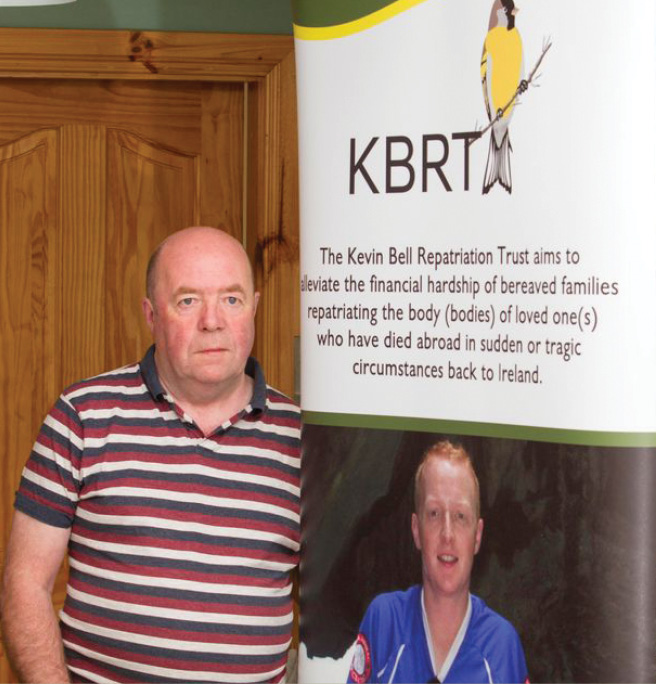

Since 2013 the Kevin Bell Repatriation Trust has facilitated the repatriation of over 200 bodies of Irish citizens back to Ireland. Ciarán Galway visits trustee Colin Bell in its recently opened Newry headquarters.
Since its inception, the Kevin Bell Repatriation Trust (KBRT) has experienced a rapid process of evolution, transitioning from relative obscurity to household recognition. This is, in some part, due to the publicity generated through media interaction with high profile individuals such as RTÉ’s Ryan Tubridy, Newstalk’s Pat Kenny and UFC fighter Conor McGregor, but also through the skill and energy of its trustees. Over the past three years the work of the family-based Trust has impacted upon virtually every county of Ireland through its efforts to help alleviate some of the pressures faced by the families of those who lose their lives abroad.
The Trust came into existence following a tragedy suffered by the Bell family. Kevin Bell, one of seven siblings, was 26-years-old when he followed in the footsteps of thousands of young men and women and travelled from Ireland to New York on a J1 visa. However, on Sunday 16 June 2013, Kevin was killed in a hit-and-run incident in the Woodlawn area of the Bronx. In the immediate aftermath, his hometown of Newry went into overdrive in an effort to fundraise the costs of Kevin’s repatriation. On the proceeding Tuesday night, £42,000 was raised in a single event, swiftly followed by an additional £20,000 two days later. Within two weeks over £150,000 had accumulated.
However, with the assistance of the Aisling Irish Community Centre in New York, Kevin’s employers facilitated his repatriation. His father, Colin Bell, a former teacher with over 40 years’ experience, outlines: “We had this huge amount of money and we decided then that we would use it to help other families who were visited with the same tragedy. In the three years since, we have grown and grown. We started [the Trust] as Kevin’s legacy and that’s what keeps us going. The fact that it keeps Kevin’s name alive and the fact that some good has come out of his death. It wasn’t totally senseless.”
This opportunity emerged exactly one month later when Irish student Stephen Clifford was killed in an accident during a holiday in Thailand. Subsequently, the Clifford family from County Down became the first to receive assistance from what would then emerge as the Kevin Bell Repatriation Trust.
Objective
As of December 2016, the Kevin Bell Repatriation trust has brought home 232 bodies. The Trust’s role in these repatriations is relatively straightforward. Bell explains: “As per our mission statement, we help families financially when they get the same news that we got; that a loved one has been killed or died tragically abroad. Not only that, we take it out of the family’s hands. When a family gets that devastating news and, coupled with the shock, they don’t know who to contact, what to do or how to go about getting their loved one’s body home. We can say, ‘look, leave it with us, we’ll make all the arrangements and we’ll also pay for it’. That’s more or less what we do.”
The Trust has four key objectives:
- to financially assist bereaved families to repatriate their loved ones;
- to ensure a permanent legacy for Kevin;
- to sustain the Trust through fundraising; and
- to recruit members to support the Trust and its ideals.
It also has a firm all-island dimension. Bell makes clear: “Whenever we decided to set up the Trust we decided that it was for the 32 counties, all colours, all creed, all anything and for anybody that needed help. Tragedy doesn’t discriminate.”
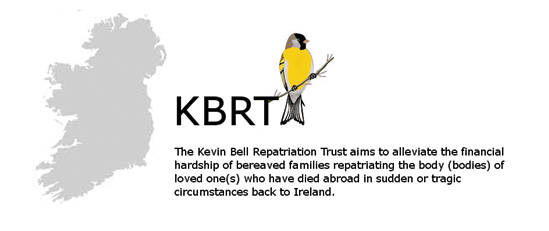
“We’re three years down the line. We’ve got the experience and we get massive support throughout the country.”
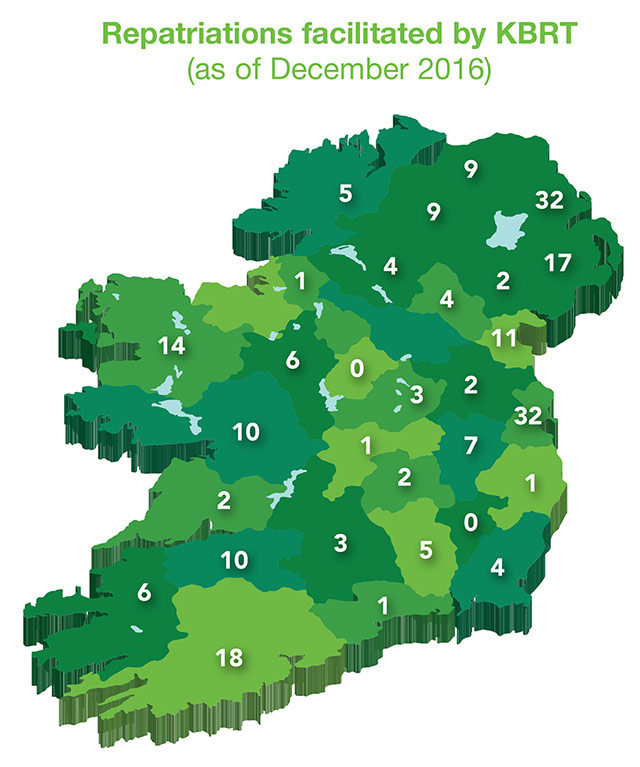
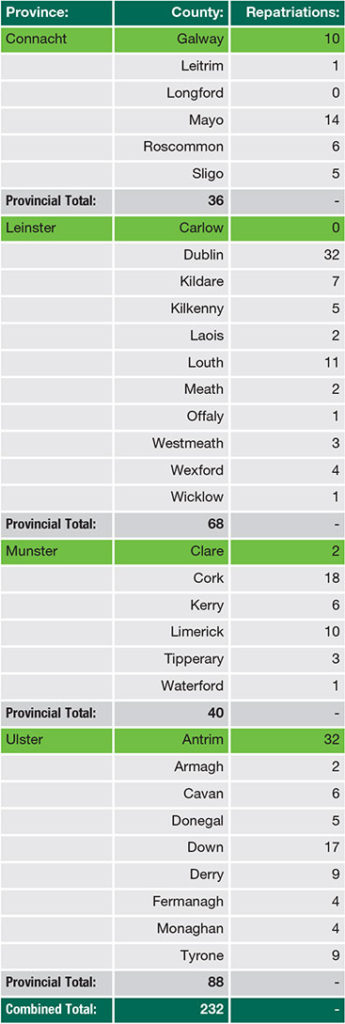
Awareness
In an effort to promote awareness of the charity and its work, the Trust collaborated with O’Neills International Sportswear to design and produce a special commemorative jersey. Simultaneously, a social media campaign was conceived to publicise the Trust by encouraging both individuals and groups to photograph themselves wearing the jersey in iconic travel and holiday destinations. Colin observes: “The jerseys are a phenomenon. We got them made to raise awareness and they really took on a whole life of their own. Now they’re in every part of the world.” Indeed, the KBRT jersey is now a ubiquitous feature of Irish communities abroad. In far-flung locations popular with Irish emigrants, from New York to Chicago, Dubai to Doha, Perth to Sydney, the distinctive green and yellow jersey is often worn.
Following an eighteen-month application process the Trust was awarded charitable “relief of stress” status in the North. In September 2015, a meeting was held between Colin Bell and then Minister for Diaspora Affairs Jimmy Deenihan. This encounter related to the pursuit of a similar charitable status for the Trust in the South. Following a subsequent appearance before the Joint Oireachtas Committee on Foreign Affairs, its Chairman Brendan Smith assured Bell: “We will again take up with the Department of Foreign Affairs and Trade the possibility of drawing down financial assistance from the emigrant support programme. We will [also] take up with the charity regulator the Kevin Bell Repatriation Trust’s application for charity status.”
In the meantime, one initial outcome of the Deenihan meeting was a letter issued to all Irish embassies and consulates on behalf of the Minister, providing information about and contact details of the Trust in an attempt to enhance an understanding of the support available to bereaved families. Bell clarifies: “The embassies can put the family in contact with us. That’s a big thing. Governments don’t pay for these things. It’s up to the families to do whatever they need to do and we take that pressure off them.”
The resulting impact has been significant: “In the last year there were over 150 people brought home. In the space of a fortnight in November last year we had eight young people who died in Perth. All totally unrelated. Last week we took home five young people, three from Canada, one from the Czech Republic and one from New York. It is a fast growing charity and one that was needed.”
Governance
Bell explains the family context of the Trust and the associated roles of Kevin’s siblings: “The Trust is mostly family-based. Conor is a chartered accountant and he does the books. Eithne looks after the jerseys. Ciara takes care of Facebook and Twitter. Seán would represent us at functions in Dublin. Eamonn and Maeve are both out in Perth in Australia and work a lot with the Claddagh Association. We have a very strong governance in that we have eight trustees. Three of them are family members. Myself, Brendan and Conor.”
At the same time, “We also have a chartered accountant, the manager of Newry Credit Union and Kevin’s friends. With regards to governance we are very strongly set up. We also have Mairead now who is our first employee and office manager. Up until opening of the centre we had been working out of the house, but it has grown so big now that we were offered this office and we were delighted.”
Challenges
The opening of the Kevin Bell Repatriation Trust centre has relieved some of the associated challenges faced by the trustees. Bell elucidates: “It means now we can come into the office from nine until half past one, Monday to Thursday and half past nine to twelve on a Friday. We come in and do the mail, banking or anything we have to do, but then we can park it and go home. We’re not living with it. It’s not in the house and it’s not 24/7 anymore. Apart from anything else, it’s good to be more formal. To have a centre for people to come to.”
However, the Trust faced many obstacles and difficulties along the road. Foremost was working through the complex intricacies of repatriating a body and building up contacts. Bell explains: “[We were] dealing with countries that, because we were so new, wanted money up front. But now when we’re dealing with the undertakers in Perth, Sydney or New York, they all know about us. They’ll send us the invoice a month down the line now because they know that they’re going to get paid.”
Likewise, those issues associated with the sensitive nature of the Trust’s work and the relative obscurity of the early days are self-evident. Colin illustrates: “In the first year nobody would have heard of us, rather we would have reached out to families. I think in the first year we only took home 24 people of all ages. In the second year it was maybe 46.”
In spite of this, Bell asserts: “At this stage we’ve got the handle on it. We’re three years down the line. We’ve got the experience and we get massive support throughout the country. To get the name out to any family in Ireland that needs our help and to let people know that we are was a challenge. I think we have probably achieved that to some degree in that there’s virtually no county that we haven’t taken someone home to. If people haven’t heard of us, then friends or someone in the area may have. With setting up the office and with proper governance, we’re in a good position now.”
He adds: “We’re getting plenty of support and should it ever be necessary that we did need help from the governments I think we have a very strong case to make.”
Overall, Colin Bell is unequivocal about the central message of the Kevin Bell Repatriation Trust. Should tragedy befall an Irish person abroad; the Trust can relieve some of the financial burden on the families left behind, ensuring the timely repatriation of their loved ones. “It’s a simple enough story. It doesn’t change,” concludes Bell.

